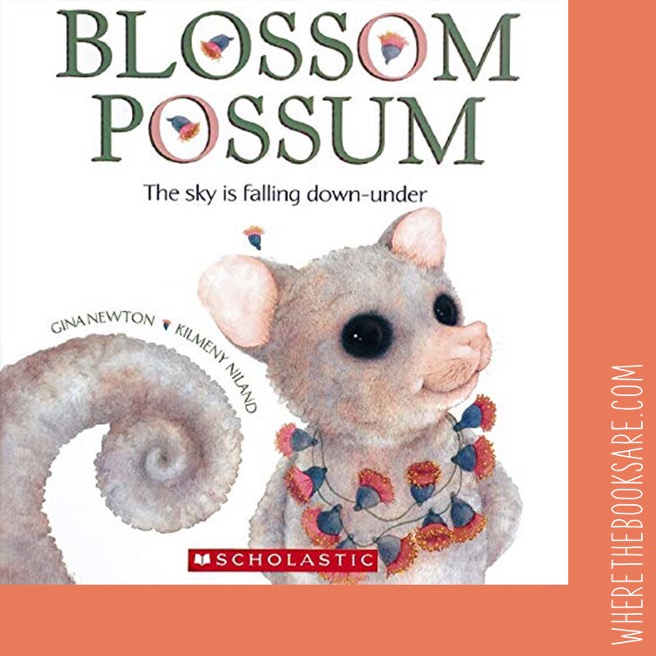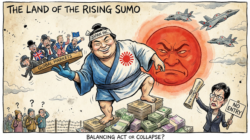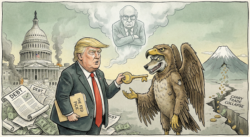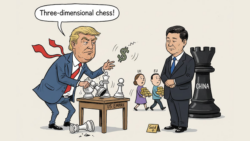We have a nightly routine in our household. After dinner, when it’s bedtime for the kids, they tidy up, shower, get their pyjamas on, then it’s story time (they choose the book, I read it) and they’re off to sleep.
Every night, the same routine.
That means we’ve got a lot of books in our house that we read.
On Sunday night, my youngest went to the bookshelf and picked one called, Blossom Possum.
It’s effectively the Australian adaptation of what you might know as Chicken Little. The subheading on the front cover tells the tale,
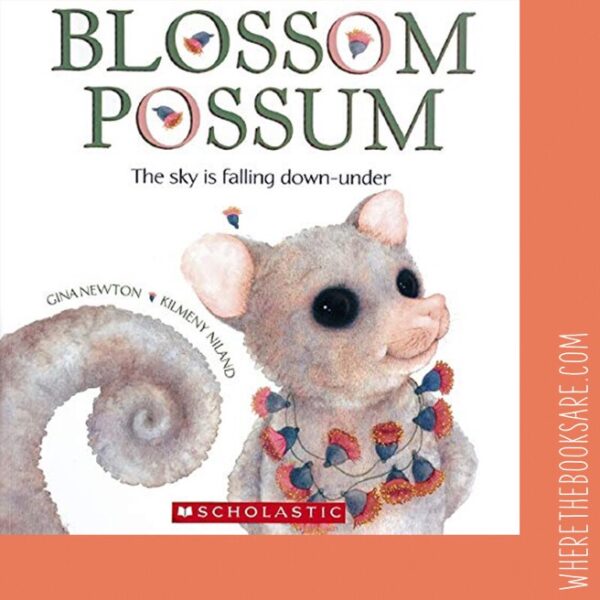
Certainly, it might feel like the sky is falling, down-under, in the UK, Europe, America…everywhere.
But I don’t think it is. Not at all…
By-Jingo Dingo
The Blossom Possum adaptation starts as you’d expect, something falls on her head, she thinks the sky is falling and heads off to let the Prime Minister know.
Along the way she meets up with Rocky Cocky (Cockatoo), Joanna Goanna, Toey Joey (Kangaroo), Abacus Platypus and Echo Gecko.
Eventually they run into By-Jingo Dingo who convinces them of a secret underground passage to Parliament House.
It’s not.
It’s a trap.
And now Dingo and his family can gobble up the cute little animals.
Thankfully, Bunyip (a mythical Australian creature), Big Red Kangaroo and Emu, thwart the Dingo’s plan, save the kids and it’s a happy ending.
But as I’m reading this book, my mind starts to wander (as it tends to do) …
I’m thinking to myself, how relevant this book is right now about the sky falling.
More and more people thinking the sky is falling (my WhatsApp group chats are blowing up!).
But is the sky falling? Or are you just heading towards a trap?
What I’m here to say is, don’t be Blossom Possum. The sky isn’t falling.
After the story, and the boys were in bed, I was on the couch absorbing a painfully boring Japanese F1 Grand Prix replay. Then my mind began to wander again, and I remembered I’d written something similar about the chicken little story a couple years ago, when markets were equally troubling.
So, on Monday morning, I dove into my archives to see if either, a) I was going crazy, or b) we’d been here before.
And voila, it was b). We had been here before.
Be a little bit Foxy-Loxy
There were two piece I’d written, one in mid-March 2019, another a couple of weeks later in early April 2019. One was a follow up to the other. But at the time I had written,
How to ride these market runs isn’t the easiest thing to figure out. After all the truth is none of us really know day to day exactly what the markets are going to do.
We certainly apply experience, knowledge and our own particular methodology to make the best, educated call we can make. But no one ever acts in the markets with absolute certainty.
Some like to use maths, algorithms and charting to make their markets calls. And then others like me take a more qualitative approach. More specifically I like to hunt out market trends that have the potential to deliver big returns to stocks that are ready to ride those trends and themes.
You might call it thematic investing. But for me it’s trying to figure out what does our future world look like, how are we going to get to that point, and what companies are going to drive it there that the everyday investors can get a slice of?
And then followed this up with,
Right now, we want to be the foxy-loxy’s of this world. Our view is that the sky certainly isn’t falling, in fact the sky never falls. Sure, there are times when it might feel like the sky is falling. And those times are when chicken-lickens are in full force.
But most of the time when the chicken-licken brigade gets going, you should channel your inner foxy-loxy because it can be a very lucrative time if you know how to play the contrarian view.
It was uncanny how relevant those words were six years ago as they are today. This also plays into a larger theory I have that over time nothing really changes we just forget the past quickly.
The heart of the matter then and today for me is simple. Things aren’t as bad as we’re led to believe. That by taking a contrarian view, with a firm eye on what our world looks like in the future, you can navigate dingo traps and end up on top.
Is the sky falling?
Of course, that does come with a slight caveat, and that is the fact the markets can remain irrational longer than most people can remain solvent.
That means you do need a good strategy, smart risk management, understanding of your own true risk tolerance and astute capital management.
Because whether we like it or not, things do come along that sure-as-heck bump us all on the head (like Trump Tariffs). But then you just need a moment to realise the sky isn’t falling. It didn’t fall before, it’s not going to now.
This whole idea of a “new normal”, and a “new global order” is the utmost fear mongering. We’ve had drawdowns, corrections, crashes, before, and will do in the future, but we always come out of it higher over time.
I don’t see any reason why that changes this time around.
When I wrote that original piece in 2019, the NASDAQ Composite was around 7,400, Nvidia was at $4, Amazon was at $80, and Microsoft was about $105 (all split-adjusted).
In the six years since, the NASDAQ more than doubled and last Friday closed at 15,500. Nvidia is up over 2,200% Amazon up over 110% % and Microsoft over 220%…and that’s even after the mass sell off in the last few weeks.
And I might add we went through COVID19 after I’d written all that too (and while that was a BIG bump on the head, the sky wasn’t falling).
Do you think now that the market is going to go back to 2019 levels? Or worse?
I don’t see it.
Sure, Trump is wild, unpredictable and no one really knows what’s coming next. But you can also bet he’s going to move heaven and earth to ensure when his term is over in four years the market is much higher than when he started.
And even if it’s not him that does it, there’s a lot of companies where even with tariffs, demand isn’t falling off a cliff (I’ve just named three above) and they will continue to be very profitable companies.
We’ve all lost money in the last week, and it may even get a bit worse before it gets better. But long term, what are the drivers of the American economy, of the market, of the future world we’ll all live in?
Those are the companies I’m looking at. Those are the companies you should be looking at. Nvidia, Amazon and Microsoft are just three of many that are now trading at very attractive values.
When you realise you’ve been bumped on the head, but the sky isn’t falling, then in my view you should be buying great long-term value stocks because there’s a lot of them on sale now.
Until next time,

Sam Volkering
Contributing Editor, Investor’s Daily
Harvard Men
Bill Bonner, writing from Youghal, Ireland
“In every disaster throughout American history, there always seems to be a man from Harvard in the middle of it.”
—Thomas Sowell
Pete Navarro is in the news. He is believed to be the ‘architect’ of Trump’s tariff policies. Fox:
White House trade advisor Peter Navarro said Monday that an offer by Vietnam to eliminate tariffs on U.S. imports would not be enough for the administration to lift its new levies announced last week. “Let’s take Vietnam. When they come to us and say ‘we’ll go to zero tariffs,’ that means nothing to us because it’s the nontariff cheating that matters,” Navarro said on CNBC’s “Squawk Box.”
Say what?
Even with zero tariffs Vietnam would still be subject to ‘reciprocal’ charges from the US? How could Vietnam eliminate the ‘non-tariff barriers?’ Make sure its currency doesn’t go down against the dollar? Change its tax policies so they do not encourage exporting?
Would it have to give up what Adam Smith called it’s ‘comparative advantage’ – cheap labor — and raise wages to the US unionized standard, with all America’s labor protections, over-time pay, holidays, and pensions?
Will oil rich nations have to compensate for having cheap energy? Cold nations will have to pay a penalty for not needed A/C? Will warm ones need to apologize for their bananas?
White House experts don’t actually analyze any of those things. They just look at trade volumes. So, the only way they will know if Vietnam is not ‘cheating’ is if the balance of trade is even. By this formula the US was a cheater from 1875 to 1971….it ran trade surpluses in all those years. It had a very efficient, advanced economy. Should it have been punished for that?
It was only after Nixon changed the world’s money system that the deficits began…and never ended. The new ‘fake’ dollar — that the US can effectively ‘print’ at will – is the cause of America’s chronic trade deficits, not NTBs. The real story: after 1971, the US could buy what it needed with its inexhaustible new money; it didn’t need to compete.
Navarro is said to have a Ph.D in economics from Harvard. This makes us very suspicious of Harvard’s standards. But Harvard has figured prominently in US history…and, usually, disastrously.
In theory, the role of a Harvard education – we get this first-hand from sharing our marriage bed with a Harvard grad for the last 41 years – is to discipline the mind so it thinks with rigorous logic, and furnish it with enough literature, history and science to give it something to think about.
How then does a man like Pete Navarro end up with a Ph.D. from that august institution? Perhaps its standards have slipped?
A bastion of privilege, power and positivism, Harvard cultivates a pernicious weed – the person who believes he can use his brain to know what others should do…and use the government to make them do it. Sprouting from seed in Cambridge, the weed spreads…and soon has covered the ground all the way to the Potomac.
Trump was looking for an economic advisor. His son-in-law reportedly found Navarro’s book (perhaps then on the remainder table, along with our forgotten classic “Empire of Debt”).
In ‘Death by China’ the author frequently quotes another Harvard guy, Ron Vara. The only problem is that there is no Ron Vara. He is Navarro’s made-up alter-ego. In effect, the ‘Death by China’ theme is supported by two Harvard men – one fictional, both delusional.
And now word on the street is that Ron Vara is butting heads with Elon Musk. Here’s Politico:
In the early hours of Saturday morning, Musk took to his social media platform X to launch an apparent attack at the president’s senior trade counselor, taking jabs at Navarro under a video in which he explained the Trump administration’s logic in levying tariffs during a CNN appearance. The Department of Government Efficiency head replied to another user’s comment on the video lauding Navarro’s explanation, writing of the economist: “He ain’t built shit.”
Then, Elon’s brother joined the scuffle. Business Insider:
Kimbal Musk, the younger brother of Elon Musk, said on Monday that President Donald Trump’s slate of reciprocal tariffs would be like imposing a “permanent tax” on US consumers.
The Musk team and the Trump/Navarro Team are not on the Same Team. Musk represents real economic interests…Trump is politics incarnate.
Tariffs are a political move…part demagoguery, part cupidity. They make politicians more powerful as they get to choose who pays what to whom. And they make a few insiders richer as they favor some industries over others. But ultimately, they weaken the economy and make everyone else poorer.
Eventually, the two teams are going to come to blows. And maybe sooner than later. Newsweek:
Musk’s open criticism of White House policy is the first time that the relationship between himself and Trump has appeared to be strained.
Musk:
“A PhD in Econ from Harvard is a bad thing, not a good thing. Results in the ego/brains>>1 problem.”
More to come…

Bill Bonner
Contributing Editor, Investor’s Daily
For more from Bill Bonner, visit www.bonnerprivateresearch.com
